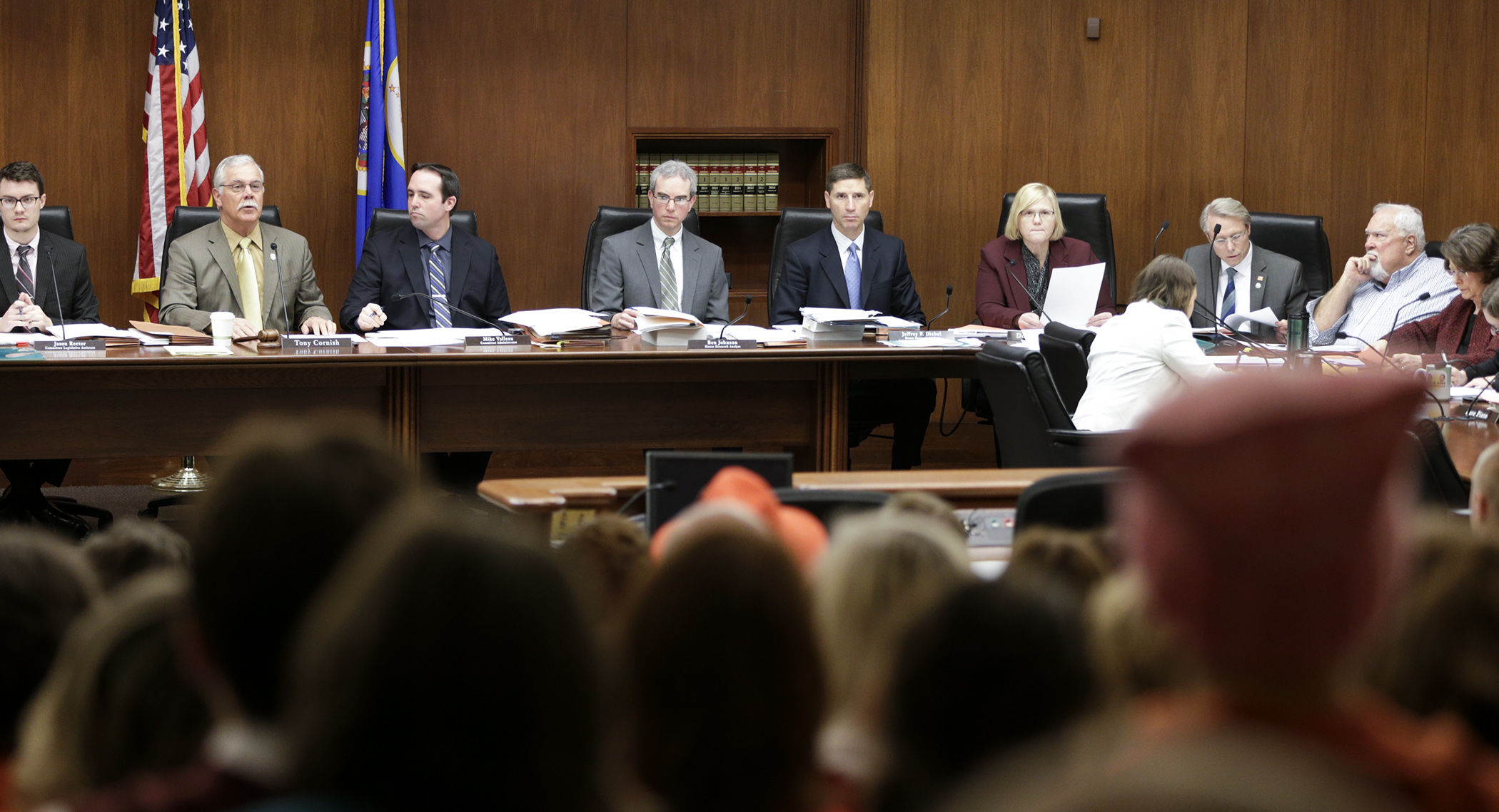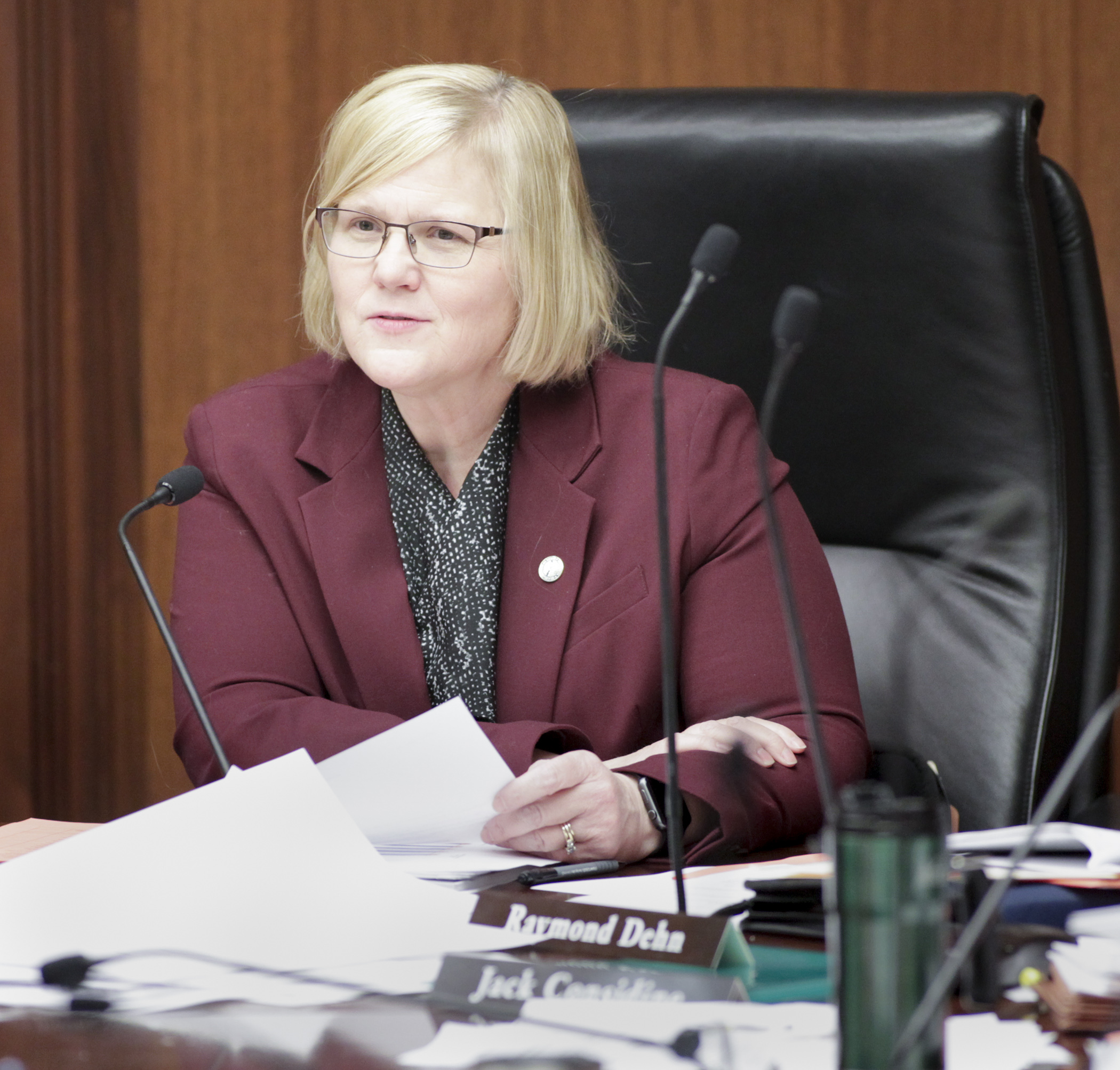Additional $111.5 million in biennial funding OK’d by public safety committee

The House Public Safety and Security Policy and Finance Committee was given a budget target that would increase biennial spending by $111.5 million, yet it isn’t enough to gain the support of all members.
Sponsored by Rep. Tony Cornish (R-Vernon Center), HF896, as amended, the omnibus public safety bill calls for almost $2.28 billion in spending during the 2018-19 biennium.
Approved Tuesday on a voice vote that was not unanimous, the bill is next scheduled to be addressed Wednesday by the House Ways and Means Committee.
“Most of us are in a position of deciding between some really good things and some really not-such-good things,” said Rep. Debra Hilstrom (DFL-Brooklyn Center). Amendments she offered to fund more corrections officers, probation officers and public defenders were defeated.
Noting that Cornish has traditionally worked with her to make issues bipartisan, Hilstrom voted for the bill. “I hope that we can make this public safety bill even better for the public,” she said.
The $2.22 billion Senate proposal, SF803, as amended, contains just over $59 million in new spending. Sen. Warren Limmer (R-Maple Grove) is its sponsor. The plan proffered by Gov. Mark Dayton calls for $2.43 billion in spending, $256 million over forecast base. Compare the House and Senate spreadsheets.
 Rep. Debra Hilstrom offers an amendment to the omnibus public safety bill during the March 28 meeting of the House Public Safety and Security Policy and Finance Committee. Photo by Paul Battaglia
Rep. Debra Hilstrom offers an amendment to the omnibus public safety bill during the March 28 meeting of the House Public Safety and Security Policy and Finance Committee. Photo by Paul BattagliaMultiple DFLers lamented the committee’s low target, saying that with the state’s projected $1.65 billion surplus, majority caucus leaders are choosing to provide $1.3 billion in tax cuts rather than addressing other state needs.
“The budget targets are not magical numbers, they’re choices made by Republican leadership about what the priorities and values are that we want to be supporting,” said Rep. Jamie Becker-Finn (DFL-Roseville). “There are a lot of issues that we do agree with across the aisle and a lot of good things that we weren’t able to fund.”
No matter which political party is in charge, Cornish countered there are always complaints that an omnibus bill does not fund enough.
“Nobody says, ‘We got enough money and don’t need anymore,’” he said. “Anywhere you take it from, they’re going to complain when you give it to somebody else.”
The bill includes a 1 percent annual inflationary salary increase for state agency employees and covers health care cost increases. That often left little room to fund other requests.
For example, $400,000 each year for the Tax Court to operate its new case management system is absent.
Chief Judge Joanne Turner said funding to replace the aging current system was appropriated last year and a new system is set to go live June 30. Without the operating funds, she said, contracts could be voided and the state could be out the “hundreds of thousands of dollars” already committed and “thousands of hours” of planning would be wasted.
The court’s base is $1.39 million annually. “Absorbing that $400,000 is not really in the cards,” Turner said. “Funding the system through salary savings is a huge gamble.”
Deputy Public Safety Commissioner Cassandra O’Hern lamented no additional funding, in part, for bomb squad reimbursement, nine more Bureau of Criminal Apprehension investigators, an additional firearms examiner and drug monitoring analyst.
WATCH Tuesday's House Public Safety and Security Policy and Finance Committee hearing
“These support our shared mission with our criminal justice partners and help us to meet our obligations to all Minnesotans,” she said.
Among policy provisions, the bill would increase the penalty from a misdemeanor to a gross misdemeanor for someone who intentionally obstructs traffic “entering, exiting, or on a trunk highway or that is entering or exiting an airport.” It would also add restricting passenger access to the statute regarding unlawful interference with transit.
It would also allow the Corrections Department to house offenders in non-publicly owned facilities, and require the department to enter into a contract to purchase or lease-to-own and operate a prison in Appleton when the department determines it has an insufficient number of prison beds to house the current or projected prison population and needs to expand an existing facility or build a new facility.
Amendments to remove each provision were rejected or withdrawn.
Added to the bill was an amendment from Rep. Nick Zerwas (R-Elk River), based off HF742, that would establish grounds the department can use to place someone in segregation, specify privileges for an inmate in segregation, require reviews of an inmate’s segregation status, provide graduated disciplinary sanctions and prohibit the release of an inmate directly from segregation into the community.
A policy provision already in the bill would prohibit the use of stays of adjudication and imposition in criminal sexual conduct cases.
Under a stay of adjudication, a conviction is not entered on someone’s record if they successfully complete probation. Once probation is completed, the charges are dismissed and the person’s criminal record is cleared of a conviction. A stay of imposition allows someone who, for example, pleads guilty to a felony offense to have the conviction deemed a misdemeanor if probation is successfully completed.
Rep. Dave Pinto (DFL-St. Paul), a Ramsey County prosecutor, said the change could result in more cases going to trial leading to potentially more acquittals and victims and survivors will have to testify. “I have a concern this will result in fewer people being held accountable for the sexual violence they perpetrate,” he said.
Related Articles
Search Session Daily
Advanced Search OptionsPriority Dailies
Ways and Means Committee OKs proposed $512 million supplemental budget on party-line vote
By Mike Cook Meeting more needs or fiscal irresponsibility is one way to sum up the differences among the two parties on a supplemental spending package a year after a $72 billion state budg...
Meeting more needs or fiscal irresponsibility is one way to sum up the differences among the two parties on a supplemental spending package a year after a $72 billion state budg...
Minnesota’s projected budget surplus balloons to $3.7 billion, but fiscal pressure still looms
By Rob Hubbard Just as Minnesota has experienced a warmer winter than usual, so has the state’s budget outlook warmed over the past few months.
On Thursday, Minnesota Management and Budget...
Just as Minnesota has experienced a warmer winter than usual, so has the state’s budget outlook warmed over the past few months.
On Thursday, Minnesota Management and Budget...